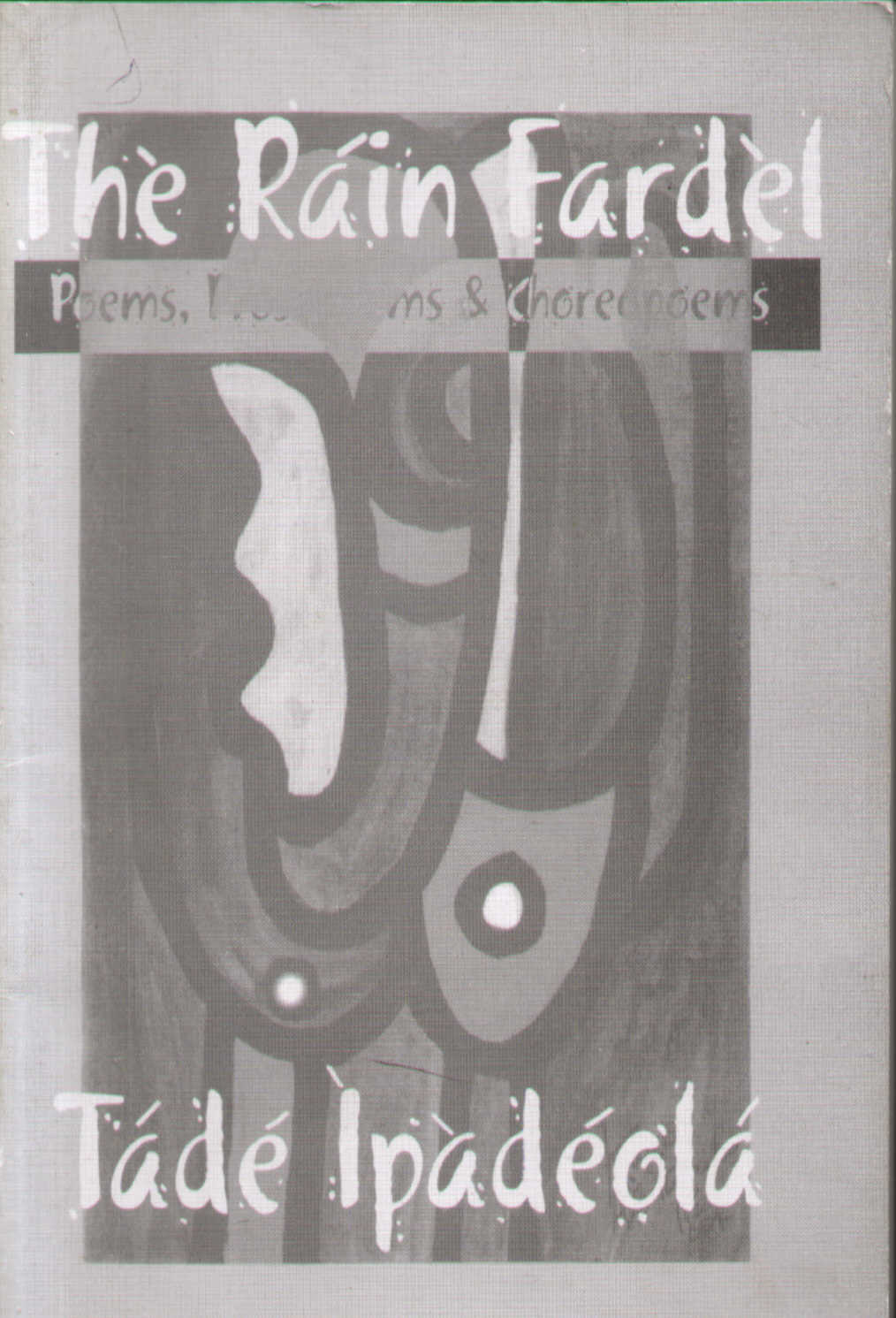By Molara Wood
Title: The Rain Fardel
Author: Tade Ipadeola
71pp, Khalam Collective, Ibadan, (Nigeria), 2005
To poet, Tade Ipadeola, the guises of rain and its attendant metaphors, are manifold; and he has produced a collection of poetry to prove the point, with his third volume, The Rain Fardel.
The call of rain, for me, was the sum of all enchantment – evoking a peculiarly human response, the poet once said. He believes that poetry is very much like rain. And rain resonates through the bundle of poems in this volume, representing Ipadeola’s take on the fathomless dimensions of man – and the earth.The ideas and moods that permeate the collection can be sensed, even in the shortest poems. Sailing, a 16 line poem of four stanzas, starts simply enough:
In an open house
By the open sea:
I become an open book
In her open arms –
With short, uncomplicated words, the poems deceptive simplicity is its strength. And with balance and flexibility, unexpected things are introduced through variations and alterations in succeeding lines. In the shifting perspective of the poem, the word open repeats itself in fresh new ways, conveying a false sense of openness – until the between us surprise of the last stanza:
It being settled quite
That nothing we open
Between us ever
Shall be by open letter.
An abundance of water motifs: streams, rills, rivers, and such like, find their way into the unlikeliest of pieces – including practising lawyer Ipadeolas meditation on the law, The Good Deed , The rain associations burst into the fluid explosion of I Love The Way in which stories break forth like a physical woman, or metaphorical sea.
A poetic plea for the captive of Biafra, Allocutus For The Basque Brethren- is a rare example in the collection of a piece in which the poets fascination with rain is constrained, bringing the tone right down to sober. The Basque of the title lends a certain universality to the Biafran sentiment. And the Latin line that precedes the main body of the poem might be intended to serve the same purpose. But it seems one of those instances in which Ipadeolas penchant for Latin phrases might have been one such reference too many.
Many of the poets influences can be glimpsed in the volume, which is introduced with rainy lines from Odia Ofeimuns verse; and there are echoes of Wole Soyinka. The latter is the subject of one of many dedications in The Rain Fardel, with Variorum. Written for the Nobel laureates 70th birthday, it reads like a performance piece. Voices speak in the lines about the many things that Soyinka represents, to Africa. Some events of his life, his literary works and episodes of African history – are deftly referenced in the poem:
And there were seasons confined
But still the Word could not be bound
Within walls of brick;
The breeze has blown
The hen has no secrets more
Riddles have met interpreters.
Soyinka is celebrated as one through whom words flooded the cosmos- like rain. Variorum incorporates music; voices and stanzas are progressively interspersed with lines from the South African Anthem, Nkosi Sikelel i Africa – carrying through the celebratory mood.
Likewise, Elegy For The Son Esa Oke Gave a tribute to Nigerias slain Justice Minister, Chief Bola Ige, celebrates the man fondly remembered as the Cicero. And thanks to the poets unfaltering musical ear, the reader can almost hear the drums in the piece, visualise the dancing. It is also shot-through with elements of Yoruba praise-poetry. Ipadeola leaves the Yoruba unfettered in the choruses, complete with tonal accents.
Deft balancing and tact raise another poem of deceptive simplicity, Talaria, above the average tribute. Knowing the value of the economy of sentiment, Ipadeola allows the main subject of the piece, R. S Thomas, to inhabit only the last of four stanzas. With a subtle layering of subject, literature and history, the poet gives the first stanza to revolutionary Lu Xun, pioneer of modern Chinese literature. The second stanza goes to Chinese General Sun Tzu, author of The Art of War – the oldest military treatise in the world. The sense of ages past is reflected in the poem, with the sudden shift to the archaism of shoguns who retreated from Sun Tzu:
FRENCH VERSION


